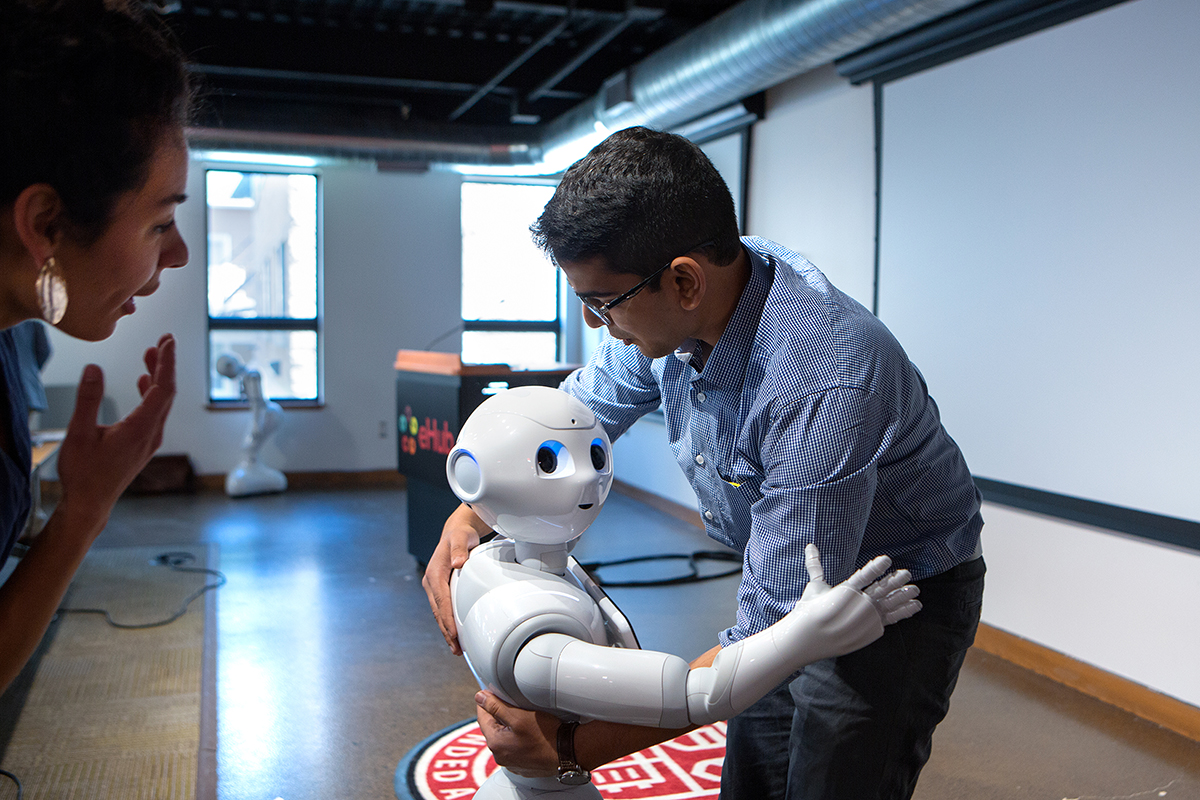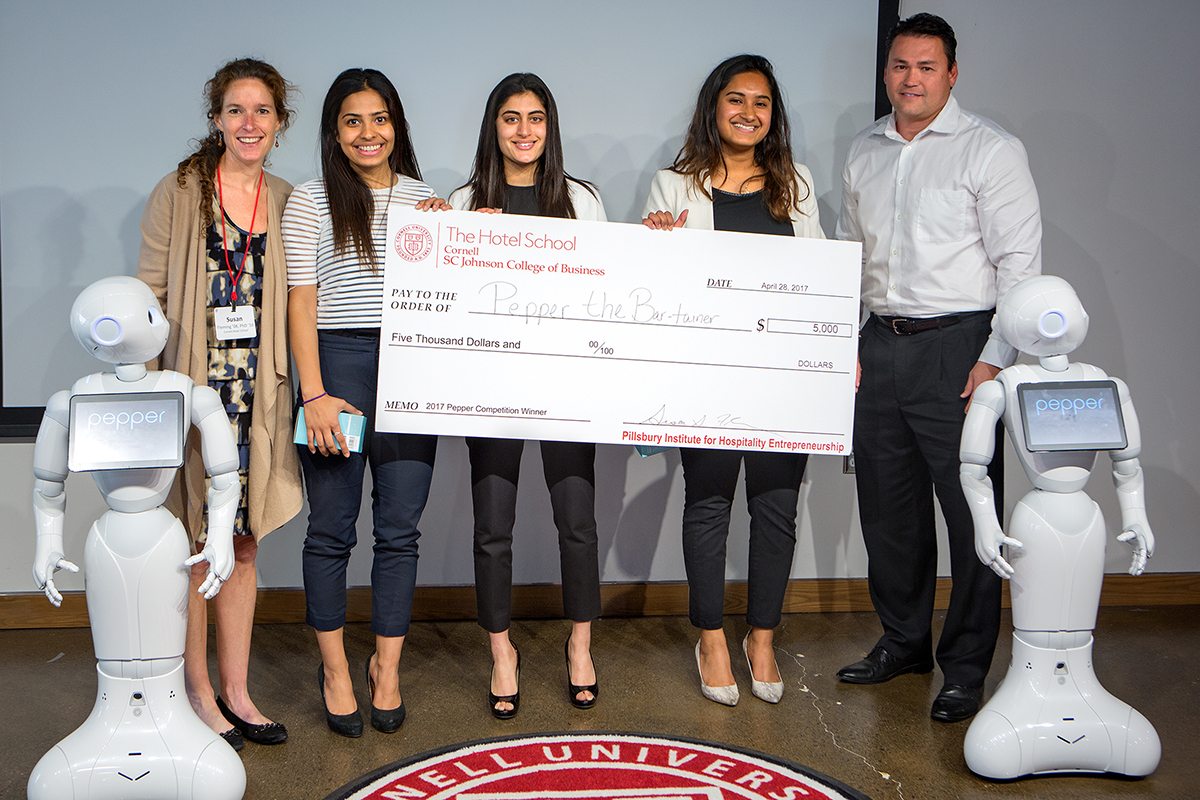Students jump-start hospitality innovation with Pepper the robot
By Susan Kelley

Rohit Verma, dean of external relations for Cornell SC Johnson College of Business, was laying out the ground rules for a one-of-a kind student business competition when a small, but crucial, participant unexpectedly chimed in.
Nine teams, Verma said, would have five minutes each to present their innovative ideas for how to make the best use of Pepper, an interactive child-size humanoid robot, in the hospitality industry.
“OK, is everybody clear?” Verma asked the audience of about 50.
“Great!” Pepper replied.
The robot’s ability to interact with humans was the key to the students’ proposals for enhancing the guest experience and optimizing hospitality operations. The competition, held at eHub Collegetown, was part of Entrepreneurship at Cornell’s Celebration Conference, April 27-28. The teams vied for $10,000 in prizes, sponsored by the School of Hotel Administration’s Leland C. and Mary M. Pillsbury Institute for Hospitality Entrepreneurship. Coordinated by Melissa Carlisle ’97, assistant director of external relations at Cornell SC Johnson, the event was sponsored by Entrepreneurship at Cornell, SoftBank Robotics and SoftBank Telecom America, and Cornell SC Johnson.
Ten executives from SoftBank, a Japanese telecom company and leading manufacturer of humanoid robots, brought three Peppers with them to the conference. To date SoftBank has sold 10,000 Peppers for $20,000 to $25,000, mostly in Japan. Named for the trusty secretary of the comic book character Iron Man, Pepper acts as a greeter in retail stores, offering customers product information and recommendations, guidance and tourism information. SoftBank has also explored applications for Pepper to work with autistic children and as a companion for older adults.
With a 3-D camera in its head and sensors at its feet, Pepper can read human emotions and react with appropriate body language, like slumping shoulders or an upright posture. It can high-five and play air guitar. It’s able to identify a user’s gender, map objects in a room, and learn to grasp small items or catch a ball in a cup.
But it’s no C3PO. It has difficulty hearing users’ voices when it moves, due to the noise its motors make. And it can’t understand run-on sentences or be used outside.

“Some very simple tasks seem quite complicated for the robot. But other very complex tasks seem easy for it,” said Rodolphe Gelin, executive vice president and chief scientific officer of SoftBank Robotics, during his conference keynote talk. “So we have to learn these things, to know how to use the robot and how to train them. … This is only the beginning of the companion robot.”
Initially 200 students submitted 60 proposals to the competition, which judges whittled down to nine teams. Each had an in-depth briefing on Pepper’s limitations and capabilities and 30 minutes of robot interaction. Faculty members from across campus also had time to check out Pepper at a separate session.
The judges – Cornell faculty, a Pillsbury entrepreneur-in-residence and SoftBank executives – rated the teams on their applications’ viability, novelty, relevance to industry and social robotics value.
The first-place business plan, winning $5,000, came from three roommates with complementary skills: Nikita Gupta ’17, a computer science major in the College of Engineering; Sonali Tolani ’17, an applied economics and management major in the Charles H. Dyson School of Applied Economics and Management; and Gauri Khanna ’17, a hotel administration major in the School of Hotel Administration.
They proposed an application for Pepper as a “bar-tainer” that would make waiting at a bar or restaurant more entertaining. With Pepper, patrons could order a customized cocktail, play games or check their makeup using its camera mirror function. For a fee, Pepper would take a photo or play song requests. At the end of the night, patrons could see if they had had too much to drink by taking a short test with Pepper, by doing simple arithmetic and reading blurry text on its tablet. They could then could ask Pepper to order a cab. The team took Pepper’s limitations into consideration and suggested it be placed in a quiet location, like a coat check or entrance.
“We realized the main problem in restaurants and bars is the wait time, which is annoying. You’d rather do something else with your time,” Gupta said. “We thought, ‘How can Pepper solve this?’”
The second-place team, Hsuan Huang and Jen-Yu Huang (no relation), graduate students in information science and chemical engineering respectively, won $3,000. Their travel app would enable Pepper to download a user’s social media profile, ask them about their interests and make customized recommendations for local activities and events.
Amanda Friedman, a sophomore in the Hotel School, won the third-place, $2,000 prize. Her application had Pepper act as a “cruise director” in nursing facilities for older adults, leading morning stretches and other activities, playing trivia games and initiating conversations among residents.
The competition pushed the students to take a realistic approach to the most advanced technology in hospitality, said Susan Fleming, Ph.D. ’09, senior lecturer and director of the Pillsbury Institute. “They had to think practically about how to use Pepper in the immediate term, as opposed to being out in the land of the fantastical. … That kind of thinking is very useful in the real world,” Fleming said.
The event may lead to more collaboration with SoftBank, Verma said. And he’d like to see Cornell partner with other innovative companies, in industries from nanotechnology to data analytics.
“By bringing in companies on the cutting edge of those technologies, and creating excitement around that with students and faculty,” he said, “it allows a lot of new opportunities for teaching and innovation.”
Media Contact
Get Cornell news delivered right to your inbox.
Subscribe